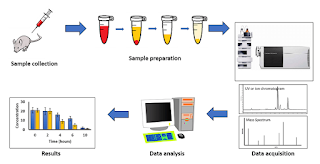CHROMATOGRAPHY TECHNIQUE
Chromatography is a collective set of
laboratory technique for the separation of mixtures. In chromatography the
sample is dissolved in mobile phase (gas, liquid, or supercritical fluid. Phase
is chosen according to the component of the sample having different solubility
in different phase to generate differences in the mobility as a result the
components get separated as they pass by the stationary phase. This technique
is analytical as well as preparative too. The main aim of the preparative
chromatography is to separate the component from the mixture for its future
application and its purification. And analytical chromatography is usually done
with the smaller amount of the sample and measuring the proportion of the
analytes in the sample. Previously these techniques were used to separate
component on the base of their colours as for herbal pigment. With the passing
time and increase in its application its demand is also extended. In today’s
world chromatography is accepted as a very sensitive case and an effective tool
for the separation method. This technique is the most efficacious for the
separation and determination of the sample component. It is a multi-residue
technique for the determination of pesticides in vegetables and fruits. Column
chromatography technique is used for the protein purification method based on
the characteristic features of the proteins and this technique is also used to control
the purity of the protein. HPLC (High Performance Liquid Chromatography) technique
has the superior feature that include its higher sensitivity, its use as
quantitative method, rapid turnover rate, and ability to purify amino acids
hydrocarbons, nucleic acids, carbohydrates, drugs, steroids and antibiotic.
Chromatography is applied in broad field which cannot be replaced by other
techniques and is predicted to be the master tool of analytical field in the
future. This technique is extending in other field and increasing its scope and
application globally.



Comments
Post a Comment